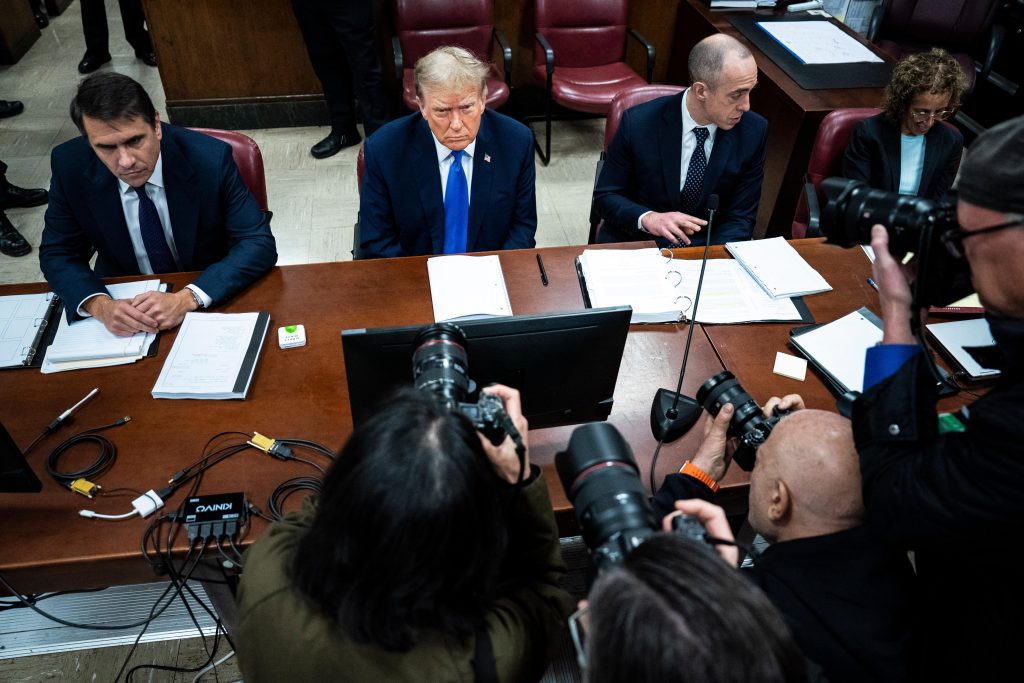By DAVID BAUDER and LARRY NEUMEISTER (Associated Press Writers)
NEW YORK (AP) — The judge in Donald Trump’s hush money trial told the media on Thursday to not reveal where potential jurors have worked and to be careful about sharing information about those who will sit in judgment of the former president.
Judge Juan Merchan took action after one juror was dismissed for worrying about being publicly known for her role in the case.
It's difficult to keep jurors anonymous in a case that has generated wide interest, while lawyers need as much information as possible to choose the jury.
Despite the setback, 12 jurors were selected by the end of Thursday for the historic trial over a $130,000 hush money payment shortly before the 2016 election to porn actor Stormy Daniels to prevent her from making public her claims of a sexual meeting with Trump years earlier. Trump has denied the encounter. The dismissed juror told Merchan she had friends, colleagues, and family members contacting her to ask whether she was on the case. “I don’t believe at this point I can be fair and unbiased and let the outside influences not affect my decision-making in the courtroom,” she said.
Merchan directed reporters not to report it when potential jurors told the court their specific workplaces, past or present. That put journalists in the difficult position of not reporting something they heard in open court, and some media organizations were considering whether to protest having that onus placed on them.
Even if that specific information wasn’t released, there was some concern that enough information about potential jurors would get out that people might be able to identify them anyway.
Politico on Thursday identified one potential juror as “a woman who lives in Manhattan and works as an asset manager.” She grew up in England and Hong Kong and lives with a self-employed boyfriend.
Another potential juror was identified as “an attorney for a large media company who lives in Gramercy Park.”
On Fox News Channel Wednesday night, host Jesse Watters did a segment with a jury consultant, revealing details about people who had been seated on the jury and questioning whether some were “stealth liberals” who would be out to convict Trump.
“This nurse scares me if I’m Trump,” he said. “She’s from the Upper East Side, master’s degree, not married, no kids, lives with her fiance and gets her news from The New York Times and CNN.”
Besides his order about employment history, Merchan said he was asking the media to “simply apply common sense and refrain from writing about anything that has to do, for example, with physical descriptions.”
He said “there was really no need” for the media to mention one widely-reported tidbit that a juror speaks with an Irish accent.
Anonymous juries have long existed, particularly in terrorism and mob-related cases or when there is a history of jury tampering. They have been ordered more frequently in the last two decades with the rising influence of social media and the anonymous hate speech that is sometimes associated with it. Usually courtroom artists are told they aren’t permitted to draw the face of any juror in their sketches; New York courts
prohibit filming trials. Trump defamation case
During the in Manhattan federal court earlier this year, jurors were given more protection of their identities by a security-conscious judge who regularly did not allow anyone in his courtroom to have a cellphone, even if it was turned off. Jurors were transported to and from the courthouse by the U.S. Marshals Service and were kept away from the public during trial breaks. During jury selection in that case, potential jurors often provided vague answers to general questions about themselves, making it nearly impossible to determine much about them.
Following the ruling in that case, Judge Lewis A. Kaplan directed
the unidentified jury not to reveal the identities of any of the people they served with and instructed jurors not to disclose their service. To date, none have come forward publicly. Ron Kuby, a criminal defense lawyer in New York, mentioned that New York state law mandates trial attorneys to be given the names of jurors, even when they are otherwise anonymous. However, he noted that this right can be overridden by the need to protect jurors’ safety.
Regarding the media, he stated that the judge cannot control what is reported, but he can greatly limit what reporters witness and hear if necessary.
“The judge could take actions. Courts have exceptional powers to safeguard jurors from tampering and intimidation. It is truly where a court’s power is at its highest,” Kuby stated.
He emphasized the importance of lawyers at Trump’s trial being able to research the social media history of jurors.
“Both sides are interested in preventing dormant jurors who have their own agenda from serving on the jury,” he stated.
Neama Rahmani, a former federal prosecutor and president of the West Coast Trial Lawyers, stated that the challenge at the Trump trial is identifying people with extreme viewpoints.
“Everyone in the entire country knows who Donald Trump is,” Rahmani stated. “Some think he’s a criminal traitor and insurrectionist. Others think he’s a hero. You don’t have a lot of people in the middle.”
The judge in Donald Trump’s hush money trial has instructed the media not to disclose where potential jurors have worked. Judge Juan Merchan also urged journalists on Thursday to exercise discretion in their comments about the potential jurors as he works to assemble a jury pool of people who can remain anonymous. Two jurors who had previously been selected were dismissed on Thursday, with one expressing concern about people she knew questioning her about whether she was on the jury. Apart from demonstrating the challenges in seating an anonymous jury, the actions may place news organizations in the difficult position of not reporting something they heard in an open courtroom.
___









